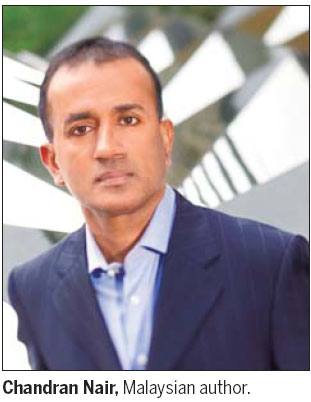Books
Heed perils of growth led by consumption, writer warns
Updated: 2011-06-24 07:52
By Yang Guang (China Daily)
It took Malaysian Chandran Nair a long time to gain the confidence to start his first book, though the idea was incubated for 20 years.
Consumptionomics - Asia's Role in Reshaping Capitalism and Saving the Planet, published in January, 2011, is about the re-emergence of Asia as an economic power, and the dilemma this poses to itself and the world.
Nair, founder and CEO of the Global Institute for Tomorrow, an independent think tank advancing the understanding of key issues and challenges related to globalization in Asia, says many Asians are too shy to express their opinions, in the wake of nearly 200 years of colonial intellectual subservience.
"Usually the narrative is shaped by Western thinkers, but my view is that a lot of them have a complete lack of understanding of this part of the world," the 55-year-old says. "They are too steeped in their own ideology."
For years, consumption has been considered the driving force of global economy. The recent financial crisis has seen Western economists and policy-makers urge Asia to consume more to help rescue the global economy.
Nair argues that if Asians were to achieve consumption levels taken for granted in the West, the result would be environmentally disastrous. It would also have significant geopolitical impacts as countries scramble for depleting resources.
The central message he conveys is that we cannot, as a global society, believe that there is going to be a market-driven solution to the crisis of resource constraints. Instead, the solution will entail making sensitive political choices and adopting certain forms of governance to effect a fundamental change of direction.
"Resource policy must be at the center of all policy-making, and for that, we need strong governments," he says.
The book brings out critical issues for readers to reconsider: the consumption of resources, the way we measure economic wealth and social health, the changing balance of power between the East and West, and the future of human society at large.
It is a call for people to abandon the goal of realizing consumption-driven capitalism in Asia and replace it with a different one - of maintaining an environment that can be passed on to future generations, one with biodiversity and adequate resources.
Born to Indian parents, Nair grew up in Malaysia. He went to Britain to study chemical engineering and then volunteered to help build water and sanitation systems in South Africa.
For 30 years, he has worked and lived in Asia, Europe, Africa, the United States and Australia. His work and interests revolve around environmental protection and social development.
Nair says the book is the result of a dinner conversation with his publisher, who suggested that Nair expand and write down what he said, after hearing his speech on the conundrum consumption-led growth poses for Asia, in Bali, in 2009. Then it took him a whole year to finally squeeze his grand ideas into this thin book.
Nair avoids giving country-specific examples in the book. But in his interview with China Daily, he points out food security and urban issues, such as the car ownership issue, in China.
In late April, he went on a five-day visit to Northwest China's Gansu province, where he visited ancient monasteries and stayed with ethnic groups.
"What impressed me was how everyone tried to live together - the Muslims, the Tibetan Buddhists, and the Chinese Han," he says. "Different beliefs, but all coexist."
China Daily


Specials

Premier Wen's European Visit
Premier Wen visits Hungary, Britain and Germany June 24-28.

My China story
Foreign readers are invited to share your China stories.

Singing up a revolution
Welshman makes a good living with songs that recall the fervor of China's New Beginning.